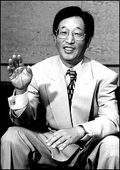Economic anthropology: localization, globalization

Shinichiro Kurimoto, a Japanese economic anthropologist, noted in his book Economic Anthropology that an important task faced by economic anthropology is to integrate the complex information from various disciplines that can offer insight into the inner workings of the economic system.
Economic anthropology is an extension of anthropological studies that has developed through integration with economics.
Complex social system
Chen Qingde, a professor from Yunnan University, said that economic anthropology should break through the barriers of traditional economics and examine the complex social system hidden behind the economic system.
Economic anthropology emphasizes the importance of culture as it relates to the development of economic society while also analyzing non-economic factors. With its broad research scope, economic anthropology not only describes patterns of production, exchange, distribution and consumption but also further explores how these systems operate and are organized, said Tian Guang, a professor from the Business School at Shantou University in Shantou, Guangdong Province.
It lays bare the workings of the social system and seeks to discover the forces driving economic operation through innovation theory, Tian said.
Chen said economic anthropology not only has expanded its research scope to cover various fields, ranging from primitive society to mankind’s universal social and economic activities during different periods, but also views problems from a broad perspective. Economic anthropology has therefore become a science that surveys economic activities from the perspective of overall structure, he said.
Interdisciplinary integration
As boundaries among different disciplines become increasingly blurred, an important task faced by economic anthropology is to integrate the complex pieces of information from various disciplines that can offer insight into the inner workings of the economic system, Shinichiro Kurimoto, a Japanese economic anthropologist, noted in his book Economic Anthropology. These disciplines include philosophy, religious studies, linguistics, structural anthropology, comparative mythology, economics and anthropology.
“Economic anthropology has been seeking new theoretical tools and expanding its research horizons,” said Chen, adding that contemporary scholars in economic anthropology should choose a proper aspect as their own academic focus and conduct interdisciplinary analysis.
“Economic anthropology can absorb new theoretical and research methods to gain vitality, through the integration with such disciplines as anthropology, economics, history and sociology,” Tian said, adding that new trends are emerging in economic anthropology. It is extending its research scope to include traditional issues as well as economic matters common to traditional and contemporary society. It also covers micro-economic and macro economic problems in addition to cultural and technological factors that affect the economy, Tian said. Moreover, it has begun to accept and apply statistical methods based on traditional ones.
Going global
Since economic anthropology entered China in the 1980s, a series of scholars have promoted the localization of its theories and methods.
“The localization of economic anthropology should be based on China’s existing theories and practices,” said Shi Lin, a professor from the School of Ethnology and Sociology at Minzu University of China in Beijing. She explained that China’s scholars have founded ethnic economics with its own characteristics from the development practice of China’s ethnic economy, which can become the “high starting point” of the localization of economic anthropology.
Some scholars said that it is an important task for China’s current economic anthropology to integrate ethnic economics with economic anthropology, and combine their traditional ideas with modern theories, achieving a rapid development of disciplinary theories.
How can we realize the localization of economic anthropology based on ethnic economics? Tian said it is an ideal way for us to carry out proper investigations on the economic social development of China, especially minority areas, through learning from the theories and methods of Western economic anthropology, and put forward concrete operable policy suggestions and implementation plans. Then we can reflect on Western economic anthropology theories based on materials and achievements of practical fieldwork, establishing and developing the theoretical mode of economic anthropology with Chinese characteristics.
In an era of globalization, economic anthropology should have an international perspective. As Shi said, a growing number of domestic enterprises have succeeded in transnational operation, with the escalation of China’s international status. The development of China’s economic anthropology has also reached a new turning point. It should “go global” in addition to being deeply rooted in domestic fields.
Ming Haiying is a reporter at the Chinese Social Sciences Today.

 PRINT
PRINT CLOSE
CLOSE